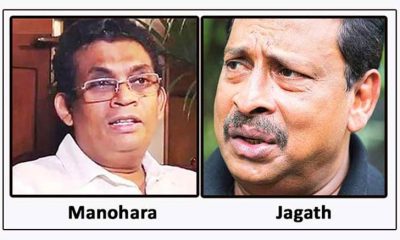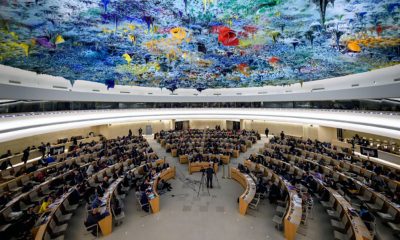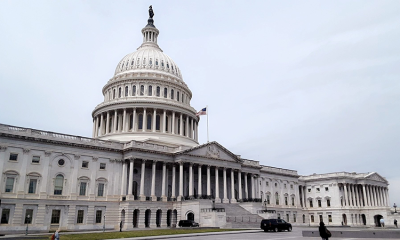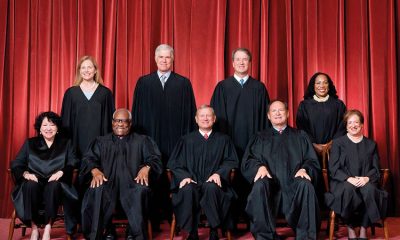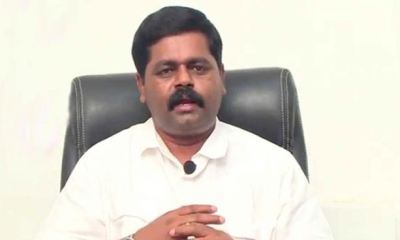Editorial
40th anniversary of Black July

The 40th anniversary of Black July which fell last week (July 23) was marked by some articles, telecasts etc. but relatively few reported commemorative events. This issue of the Sunday Island carries two very insightful articles by two regular correspondents, Rajan Philips domiciled in Canada and Uditha Devapriya in Colombo of what was the worst ever holocaust unleashed by Sinhala mobs. The J.R. Jayewardene government of the day chose to turn a blind eye to the horrors perpetrated that resulted in some of the best and the brightest of this country permanently emigrating. In addition Sri Lanka’s image was blackened globally and the scars of what happened remain to haunt this country to the present day.
Apologists claim that the terrible violence of July 23 and the days that followed was provoked by the terrorism of the Liberation Tigers of Tamil Eelam (LTTE) and like-minded organizations later annihilated by the Tigers. Undoubtedly terrorist events in the North that left dozens of policemen lynched on lamp posts and troops blown to bits in landmine ambushes provoked widespread resentment in the South. Comments in Colombo Tamil society of “our boys” giving it back to an undefined but clearly identifiable “them” certainly fueled the flames. But whatever the provocation, it was the obligation of the country’s president and his government to protect its citizen from the violence inflicted. History will judge, if it has not already done so, President J.R. Jayewardene, elected six years earlier with an unprecedented mandate, for this colossal failure.
There have been allegations that the president himself had given the nod to a senior minister in his government who made no secret of his anti-Tamil tendencies, to give that community “a knock.” But the situation went horribly out of control and that knock blew up into a pogrom, holocaust or what have you. Urged to call out the military soon after the violence began, there were reports that the commander-in-chief dragged his feet fearing that his orders may not be obeyed. In his first address to the nation after the horror was unleashed, the president focused on the immediate event that triggered the violence and did not offer a word of sympathy to the victims. However that be, the fact was that July 1983 became a landmark that tarnished Sri Lanka’s image globally, created a Tamil diaspora that funded the LTTE either willingly or through extortion, won support for the separatist cause and gave impetus to a civil war that dragged on for nearly three decades.
There is no need to labour the facts of what it cost this nation, on both sides of the lines, in terms of lives lost and treasure. A small island like ours with a population of around 22 million today has a military that is nearly 350,000 strong in the three armed services. Before the war we had a mere internal security force of a few thousand. Although we have not had any conscription in our contemporary history, the needs of the civil war made our forces grow, according to an internet report, to the 18th largest military force in the world. However that be, since the war ended there have been perhaps perfunctory efforts to downsize the military but budgeted defence expenses have been going up annually.
The upshot of the civil war, as Rajan Philips has noted in his regular column on this page, was Indian military involvement in Sri Lanka. The Indian Peace Keeping Force (IPKF) was deployed here in terms of the Indo – Lanka Agreement of July 1987 signed by President J.R. Jayewardene and Prime Minister Rajiv Gandhi. The IPKF was here for 32 months but failed to disarm the LTTE which it relentlessly battled losing 1,165 soldiers for whom a memorial stands close to Colombo. The fatalities on the Indian side was higher than the number of troops India had lost in two wars with Pakistan. Tragically, India which had trained and based LTTE fighters in its territory during the course of the conflict had to pay the price of losing Rajiv Gandhi who had by then ceased to be the prime minister but was campaigning to return to office when an LTTE suicide bomber took his life.
This newspaper scooped the correspondence exchanged between President Premadasa who succeeded Jayewardene regarding the withdrawal of the IPKF from Sri Lanka. While Premadasa armed the LTTE to fight the IPKF and the Tamil National Army which fought alongside it, he failed to secure its withdrawal during Prime Minister Gandhi’s tenure. The withdrawal was concluded when V.P. Singh became the prime minister of India after Gandhi’s electoral defeat. We published the first part of this exchange of letters the previous Sunday and conclude it today.
That good relations with India must be a cornerstone of Sri Lanka’s foreign policy is a reality that cannot be ignored. India proved to be very much a friend in need during the worst economic crisis faced by this country which had to declare bankruptcy earlier last year. Indian economic assistance and investments continue to flow in. While being grateful for the benefits accruing, we must grasp the reality that there’s no free lunch in this world.
Editorial
Ground Zero of corruption

Tuesday 1st April, 2025
New laws will be made soon to facilitate the seizure of ill-gotten assets of the corrupt, President Anura Kumara Dissanayake has said at a recent NPP campaign rally. The government has chosen to crank up its anti-corruption campaign again as the local government polls are drawing near. Laws with stronger teeth to deal with corruption cannot be overstated.
Hydra-headed corruption can manifest itself in various forms at different levels, which can be individual, political, corporate, systemic and cultural. It has become extremely difficult to rid Sri Lanka of corruption because of the prevailing culture of corruption. The focus of all anti-corruption drives launched by some governments including the incumbent one has been on tackling corruption at the individual level, as evident from the cases filed by the Commission to Investigate Allegations of Bribery or Corruption against politicians out of power and state officials.
Much is being spoken about allegations of bribery, fraud, nepotism, cronyism, embezzlement, etc., against former government leaders and their bureaucratic lackeys. There is no gainsaying that corrupt individuals have to be brought to justice, but corruption at the political party level must also be addressed. Successive governments have failed to tame the rice millers’ cartel owing to corruption. Wealthy millers have huge slush funds, part of which they dish out to political parties and politicians of all hues so that their interests will be served whoever comes to power. This quid pro quo has stood them in good stead. Curiously, even the JVP/NPP leaders who roared like lions before last year’s elections, vowing to take on the so-called rice Mafia and safeguard the interests of farmers and consumers, are now mewing.
The questionable green-channelling of as many as 323 red-flagged freight containers in the Colombo Port in January can also be considered an instance of corruption, for they are believed to have carried contraband. Big businesses bankroll election campaigns of political parties and politicians of their choice and receive favours in return. The sugar scam is a case in point. Following the 2019 regime change, the SLPP suddenly reduced the special commodity levy on sugar imports from Rs. 50 a kilo to 25 cents a kilo for the benefit of some of its financiers who had ordered a huge stock of sugar. The state coffers lost billions of rupees as a result.
The NPP government is under pressure to have former Central Bank Governor Arjuna Mahendran extradited from Singapore to stand trial here for the Treasury bond scams. Strangely, those who are out for Mahendran’s scalp have stopped short of calling for a probe to find out how the UNP benefited from the Treasury bond scams. The UNP headquarters, Sirikotha, was struggling to pay its utility bills at the time of the January 2015 regime change. But it outspent its political rivals including the UPFA in the run-up to the August 2015 general election! It is believed that the UNP benefited from the largesse of the Treasury bond racketeers.
In Sri Lanka, which is known for the weak enforcement of campaign expenditure laws and a chronic lack of accountability, headquarters of political parties are believed to be built on foundations of undeclared funds, including black money.
The SLPP repaired its headquarters in record time following the 2022 mob attacks, which inflicted extensive damage on it. Where did funds for the construction of that place and repairs to it come from? Some Opposition politicians have alleged that the JVP is the richest political party in Sri Lanka, and cast suspicion on how funds were raised for the construction of its headquarters at Battaramulla. The SLFP, which was in penury for 17 years after its ignominious defeat in 1977, enriched itself after its comeback in 1994. The SJB has also spent huge amounts of funds on its election campaigns and social welfare projects. How has it raised funds?
It is believed that political parties are the ground zero of corruption in this country, given their undeclared funds, only a part of which they spend on their election campaigns. There is a pressing need to probe the assets of these parties, whose holier-than-thou leaders embark on anti-corruption crusades to garner favour with the public. That, we believe, will be half the battle in ridding the country of corruption.
Editorial
‘Monkey menace’

Monday 31st March, 2025
The JVP/NPP administration has sought to handle crop-raiding monkeys exactly the way Sri Lankan governments deal with their political opponents—throwing them into prison. While the Opposition is complaining that some of its members are being arrested and remanded at the behest of the powers that be, the government has unveiled a plan to relocate monkeys in Kandy to some aits in reservoirs in the Central Province. Environmentalists and animal rights groups have already started protesting against this grand plan and questioning the feasibility of the proposed project. Will the monkeys to be taken to those eyots have access to food? Will they be left to their fate after being relocated?
The so-called monkey menace is far too complex to be tackled once and for all with the help of simple methods such as translocation. How does the government intend to deal with the monkeys in other areas, where there are no reservoirs/rivers with aits? Besides, the government had a hard time enumerating the monkeys the other day, and how difficult it will be to catch them goes without saying. One may recall that it took Wildlife officers about one whole week to catch and treat a wild jumbo that had lost one of its tusks in a collision with a truck on the Habarana-Maradankadawala road near Galapitagala recently.
What characterises the strategies adopted by successive governments to prevent depredation is that they are human centric, with little attention paid to the crop-raiding animals that are also victims. Their focus has been on preventing crop raiders from invading human habitats, and the methods used for that purpose include warding off wild animals, their translocation and controlling their populations.
There has been a persistent campaign for physically eliminating depredators as a quick fix. Much is also being spoken about the need to erect electrified fences, etc., to prevent wild elephants from invading villages. The desperation of cultivators, politicians and officials to deal with the ever-worsening problem of crop losses might make such measures look like lasting solutions, but they alone will not yield the desired results in the long run.
Hence the need to adopt a holistic approach to the problem and examine all dimensions thereof, especially the adverse impact of human activity on animal habitats. While short-term measures may be compelling, they will not help eliminate the root causes of the problem, paving the way for a sustainable solution.
The success of any strategy to prevent depredation hinges on the elimination of the factors that drive wild animals to invade villages and ravage the crops. Some methods employed in other countries to overcome the problem include establishing protected areas for wild animals, restoration of degraded habitats, promoting sustainable agriculture, reducing animal habitat fragmentation and creating corridors to allow animal movement among fragmented habitats.
In Sri Lanka, post-harvest losses are reportedly around 40% due to temperature and humidity, lack of infrastructure, storage facilities, and technology, and poor handling practices. If these losses can be minimised significantly, it may be possible to reduce the amount of land currently used for agriculture and prevent the opening up of more land, especially ecologically sensitive areas like peripheral forests, for cultivation at the expense of animal habitats.
One of the main reasons for the failure of the Gotabaya Rajapaksa government was that it had too many experts who undertook tasks they had little knowledge of; some medical doctors determined that administration’s agriculture policy, and made a mess of it, the disastrous organic farming initiative being a case in point. A minister of the incumbent government has given his expert opinion about a recent Sri Lanka Air Force trainer jet crash, attributing it to a pilot error even before an expert probe committee submits its report on the accident. So, the task of tackling the problem of crop raiders should be left to real experts; politicians and others should confine themselves to playing a supportive role.
Editorial
Setting a good example

Winding up the 2025 budget debate in his capacity of finance minister, President Anura Kumara Dissanayake once again told the country that legislation to abolish MPs’ pensions is forthcoming, presumably in the short term although he has not specified when. However, opposition lawmaker Ravi Karunanayake has stolen a march on the president and his government by bringing a private member’s motion to abolish pensions for parliamentarians which has already been unanimously adopted by the legislature and is now awaiting a formal government Bill for enactment. Ironically, MPs who voted unanimously to give themselves pensions are now on the brink of similarly voting to abolishing them.
We have on previous occasions harked back on the fact that former prime minister, Sir John Kotelawela, famously exhorted henda athey thiyanakan bedaganilla (as long as the spoon is in your hand, serve yourselves). This, our lawmakers have been assiduously doing over the decades. The parliamentary pensions, non-contributory as in the case of coveted pensions for life paid to public servants, was later extended to their widows and orphans. But in the case of the public service, surviving spouses and orphans were covered by a contributory Widows and Orphans Pension Fund while parliamentarians paid nothing for this extended privilege to their widows.
The president correctly understands that perks and privileges elected officials vote for themselves are deeply resented by the public. He has hence scored brownie points for himself and his government by announcing that having discovered that he was being paid an MP’s pension in addition to his salary as executive president, he was foregoing the former entitlement and has already written to parliament’s secretary general to that effect. He further announced that the present all powerful regime has decided that its ministers and deputy ministers will not enjoy both their parliamentary emoluments together with the salaries for their official positions. They are foregoing the former but will enjoy a fuel allowance on account of the latter. We do not know if this dual payment was made was so in the past.
Although President Dissanayake has not said as much, it appears that many of his predecessors in office have drawn their parliamentary pensions in addition to presidential entitlements covered by statutes. The demand for pensions go back to the previous House of Representatives when LSSP leader, Dr. NM Perera, a highly qualified senior full time politician with no professional income unlike some of his colleagues, suggested such payments. He has however been derided for, despite his socialist professions, being a plantation owner (Oakfield nd Moragolla estates) and owning a mill (Giridara) which became a cause célèbre in the sixties.
When legislation for parliamentary pensions was eventually enacted remains uncertain. Former secretary general of parliament, Mr. Nihal Seneviratne in his book of memories of a long career in parliament, which we are excerpting and running at present, says the legislation was introduced by a former speaker, Mr. KB Ratnayake, who was once minister of parliamentary affairs and sports. Other reports say that it came during the tenure of the JR Jayewardene government. However that be, such pensions have long been paid and many senior politicians who decided not to run for re-election fearing defeat at the last elections are now in receipt of their pensions.
Time was when eminent people spent private wealth to render public service through election to the legislature. Times have changed and opportunistic politicians seeking elected office to get what they can from such positions – legitimately and illegitimately – are dime a dozen. President Jayewardene often claimed that he made political office sufficiently materially attractive to discourage corruption. Singapore’s legendary Lee Kwan Yew did as much. While Lee achieved a desirable result, sullied occasionally though the guilty have been successfully prosecuted and jailed, Sri Lanka has abjectly failed on this score.
There was one instance in the sixties when a senior Eastern Province politician, who had served as a parliamentary secretary, lost his civic rights for seven years following the Thalgodapitiya Bribery Commission report and was expelled from parliament. Two ministers found guilty by that commission had the grace to resign. But we have seen a politician convicted of murder and sentenced to death being elected to parliament a few weeks later and being sworn as an MP despite the ruling of the attorney general that he was ineligible to sit. He was eventually acquitted on appeal, There was also a minister in the last government convicted for extortion with a suspended sentence of imprisonment and a hefty fine continuing to sit in the legislature and function as a minister while an appeal was pending.
The current government seem determined to halt the past practice of heaping gravy on the plates of elected politicians. No ministers or deputy ministers of the present regime live in government housing as was common in the past. Nor do the president and prime minister. There have been ministers who had built swimming pools at taxpayer cost in their official residences. One even installed an elevator in his official bungalow for his aging mother through a state corporation under his purview. Others have not paid utility bills for which they were liable.
The present regime has showcased profligacy of the past including luxurious mansions occupied by past presidents at taxpayer expense, hefty payments made to politicians whose homes and offices were attacked by aragalaya protesters far exceeding the caps on compensation payable to victims of natural disasters and much more. The report of the KT Chitrasiri Committee on trimming fat off the political establishment is in though not published. The government seems seriously intent on setting a good example and correcting past excesses.
-

 Sports2 days ago
Sports2 days agoSri Lanka’s eternal search for the elusive all-rounder
-

 Features6 days ago
Features6 days agoCelebrating 25 Years of Excellence: The Silver Jubilee of SLIIT – PART I
-

 Business6 days ago
Business6 days agoCEB calls for proposals to develop two 50MW wind farm facilities in Mullikulam
-

 Business4 days ago
Business4 days agoAIA Higher Education Scholarships Programme celebrating 30-year journey
-

 News3 days ago
News3 days agoGnanasara Thera urged to reveal masterminds behind Easter Sunday terror attacks
-

 Features6 days ago
Features6 days agoNotes from AKD’s Textbook
-

 News2 days ago
News2 days agoComBank crowned Global Finance Best SME Bank in Sri Lanka for 3rd successive year
-

 Features2 days ago
Features2 days agoSanctions by The Unpunished


